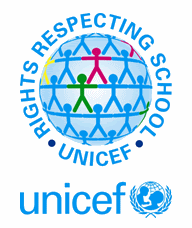You are here: Pupil Leadership > Rights Respecting Schools Committee


At St Charles' Primary & LCR, the children are at the heart of everything we do. In recognition of this, on the 26th March 2024, we achieved the second stage of the Rights Respecting Schools Award, the UNICEF Rights Respecting School Silver: Rights Aware Award. This means that children's rights are learned, understood and lived in our school. Mrs Burke leads this area in our school along with the support of the Rights Respecting School Committee, who meet frequently throughout the year to ensure we are doing all we can to support each other's rights and continue to develop and improve in what we do. Now we will continue on our journey to achieve Gold.
What is a Rights Respecting School?
In a Rights Respecting School, young people and the school community learn about children’s rights, putting them into practice every day. The Award is not just about what children do but also, importantly, what adults do. In Rights Respecting Schools, children’s rights are promoted and realised, adults (duty bearers) and children (rights holders) work towards this goal together. Duty bearers and rights holders commit to this shared goal by learning about their rights, through their rights and for the rights of others.
There are four key areas of impact for children at a Rights Respecting school; wellbeing, participation, relationships and self-esteem. The difference that a Rights Respecting School makes goes beyond the school gates, making a positive impact on the whole community.
Children are healthier and happier
By promoting the values of respect, dignity and non-discrimination, children’s self-esteem and wellbeing is boosted and they are less likely to suffer from stress. A child who understands their rights understands how they and others should be treated and their sense of self-worth is strengthened.
Children feel safe
The Rights Respecting Schools Award gives children a powerful language to use to express themselves and to challenge the way they are treated. They are also able to challenge injustices for other children. Children and young people are empowered to access information that enables them to make informed decisions about their learning, health and wellbeing.
Children have better relationships
Both with their teachers and their peers, based on mutual respect and the value of everyone’s opinion. In a Rights Respecting school children are treated as equals by their fellow pupils and by the adults in the school. Children and young people are involved in how the Award is implement in the school but are also involved in strategic decision-making; in decisions about their learning; and in views about their well-being.
Children become active and involved in school life and the wider world
This builds their confidence to make informed decisions. They have a moral framework, based on equality and respect for all that lasts a lifetime, as they grow into engaged, responsible members of society. Children and adults develop an ethos and language of rights and respect around the school. Rights and principles of the Convention are used to put moral situations into perspective and consider rights-respecting solutions – this all has a huge impact on relationships and well-being. Children and young people get very involved in raising awareness about social justice issues, both at home and abroad. They become ambassadors for rights and take part in campaigns and activities to help to bring about change.
What rights do children have?
The UNCRC stands for the United Nations Convention on the Rights of the Child. The CRC sets out the human rights of every person under the age of 18 and is the most complete statement on children’s rights treaty in history. It was adopted by the UN General Assembly in 1989 and is the most widely adopted international human rights treaty in history. The UK ratified the CRC in 1991. A copy of the CRC can be found in the links below. Please watch this short video clip for further information surrounding young people's rights under international human rights law (the Convention on the Rights of the Child or CRC for short):
Please click on link below:
A Summary of the United Nations Convention on the Rights of the Child